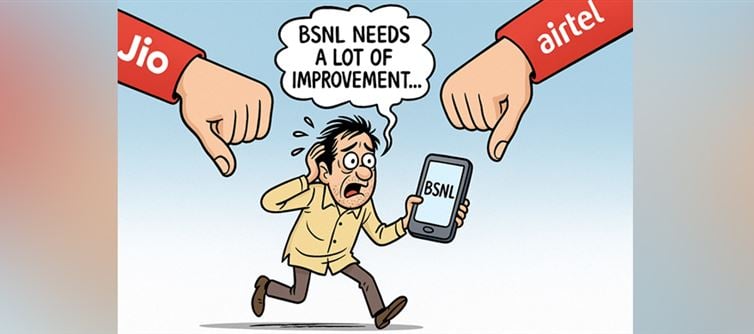
India’s Telecom Dream Has Turned Into a Common Man’s Nightmare
Once hailed as the revolution that connected india — cheap data, free calls, wallet PLATFORM' target='_blank' title='digital-Latest Updates, Photos, Videos are a click away, CLICK NOW'>digital freedom — the telecom story has now turned into a slow strangulation of the common man’s wallet.
Jio, airtel, and Vi are preparing to hike recharge prices by up to 10% in the coming months. The so-called “industry correction” will once again push the cost of living higher for millions of ordinary users — students, gig workers, small businesses, farmers — who rely on their phones not for luxury, but survival.
As the industry giants chase Average Revenue Per User (ARPU) targets, India’s telecom sector is starting to look less like a service — and more like a syndicate.
The Silent Squeeze: How Telecom Giants Are Milking Users
The script is eerily familiar. First, they phase out cheaper plans — quietly removing the ₹149 or ₹199 daily data packs that gave users 1GB per day. Then, they push new “minimum recharge” packs, forcing customers to pay more for less.
Jio and Airtel have already scrapped their 1GB/day plans, replacing them with expensive 1.5GB or 2GB options — not because people demanded it, but because it forces higher ARPU.
It’s not a coincidence. It’s a strategy.
They know users can’t switch — so they keep tightening the noose, rupee by rupee, gigabyte by gigabyte.
And Vi, despite its financial struggles, is expected to join the cartel soon — not to compete, but to survive.
BSNL: The Only Affordable Option That Barely Works
For millions of low-income users, BSNL remains the only hope for affordable connectivity. Its plans are cheaper, its data offers generous. But there’s one fatal flaw — it barely works.
Poor coverage, outdated infrastructure, and frequent signal drops make bsnl a network of nostalgia, not reliability. Even in urban areas, calls fail, data stalls, and users are left helpless.
BSNL’s bureaucratic pace and lack of modernization have allowed private players to dominate. And now, with no serious competition, the others are doing what monopolies always do — raise prices without accountability.
TRAI’s Silence: The Watchdog That Forgot to Bark
Where is TRAI — the Telecom Regulatory Authority of india — in all this?
The body that was meant to protect consumers from corporate exploitation seems more interested in issuing polite advisories than enforcing fairness.
When operators openly chase “higher ARPU” as a goal — at the expense of affordable access — TRAI should be asking tough questions. Instead, the regulator has turned into a mute spectator while three private players dictate the price of connectivity for 1.4 billion Indians.
This isn’t market freedom — it’s regulatory failure.
Digital india or Dystopian India?
Every government speech celebrates Digital India, but what’s wallet PLATFORM' target='_blank' title='digital-Latest Updates, Photos, Videos are a click away, CLICK NOW'>digital about an india where:
Students skip online classes because the data is too costly,
Small traders can’t afford 4G packs,
Villagers pay more for a network that barely reaches them?
In a country where internet access = opportunity, data hikes are not just a financial burden — they’re a barrier to equality.
When jio entered the market in 2016, it promised “Digital for all.” Now, the same jio leads the charge in pricing out the poor.
The Common Man’s Anger: “Why Are We Always Paying the Price?”
From electricity to groceries, and now mobile recharges — everything costs more. Yet salaries, daily wages, and job opportunities remain stagnant.
For the auto driver who depends on UPI, the student who studies online, the delivery worker who navigates via GPS, or the farmer checking crop prices on his phone, this hike is not minor — it’s punishing.
Telecom isn’t a luxury. It’s a lifeline. And that lifeline is being priced beyond reach.
The Need for Competition — and Consequence
india needs two things urgently:
Real competition — to break the cartel-like grip of jio, airtel, and Vi.
Real regulation — to stop ARPU obsession from turning into economic oppression.
If TRAI doesn’t intervene now, the day isn’t far when a 3-month plan costs ₹2,000 to ₹3,000, and the “Digital India” dream collapses under its own greed.
The Bottom Line: Bring Down the Telecom Tyranny Before It’s Too Late
When three corporations can collectively dictate what 1.4 billion people pay for a basic necessity, democracy starts to look like a monopoly.
The telecom giants are not competing for consumers anymore — they’re colluding for profit.
And TRAI, instead of being the watchdog, has become a lapdog.
india deserves better — better networks, better regulation, and a fair price for connectivity.
Because if the common man can’t afford to stay connected, then no “Digital India” slogan can hide the disconnect.




 click and follow Indiaherald WhatsApp channel
click and follow Indiaherald WhatsApp channel